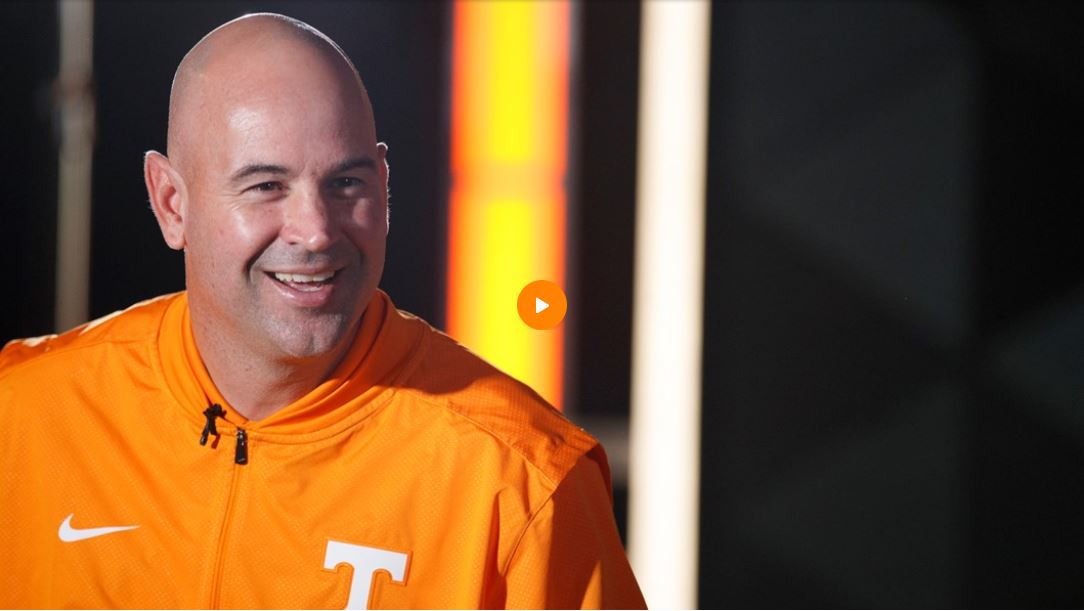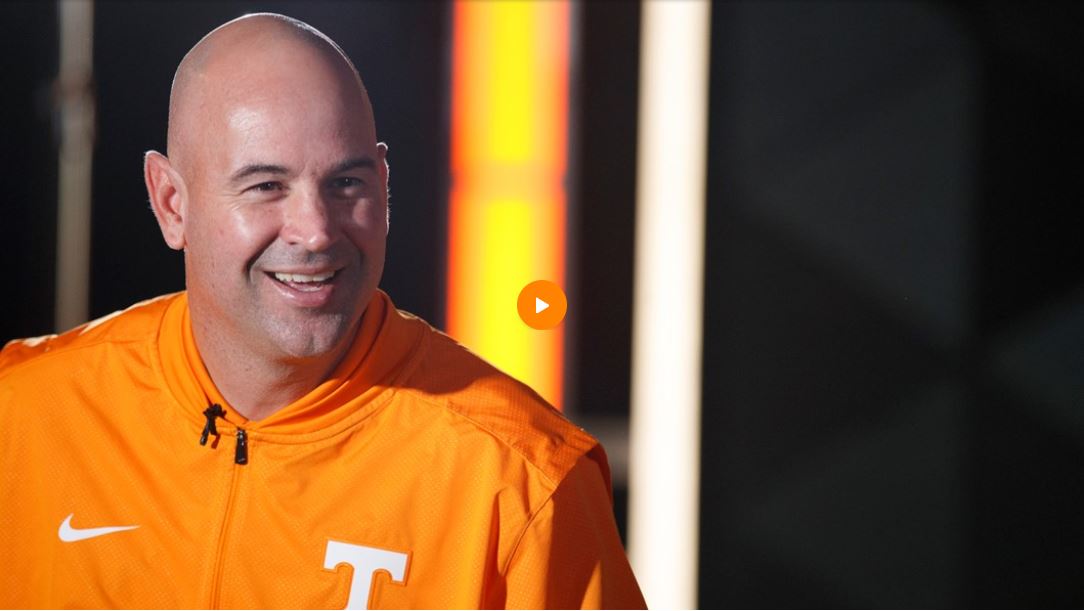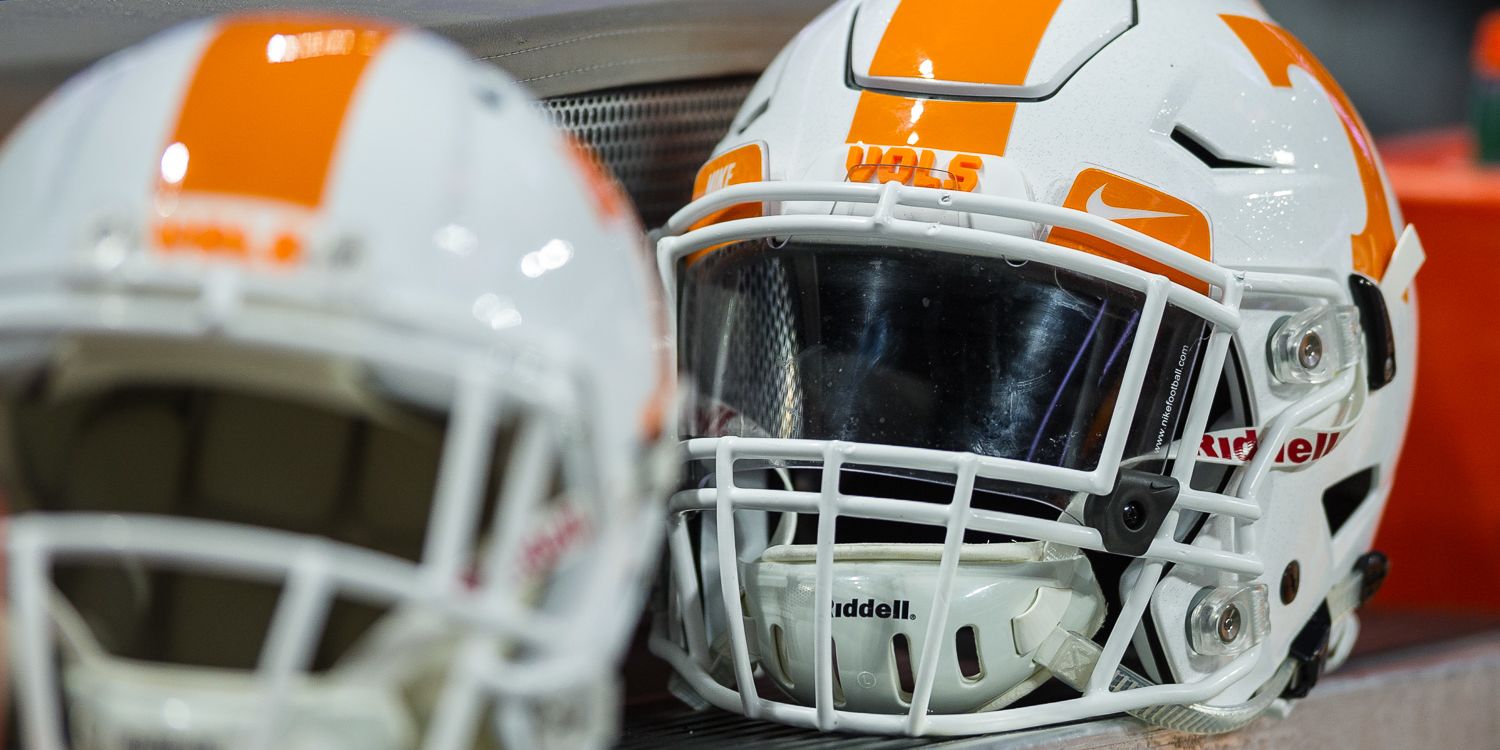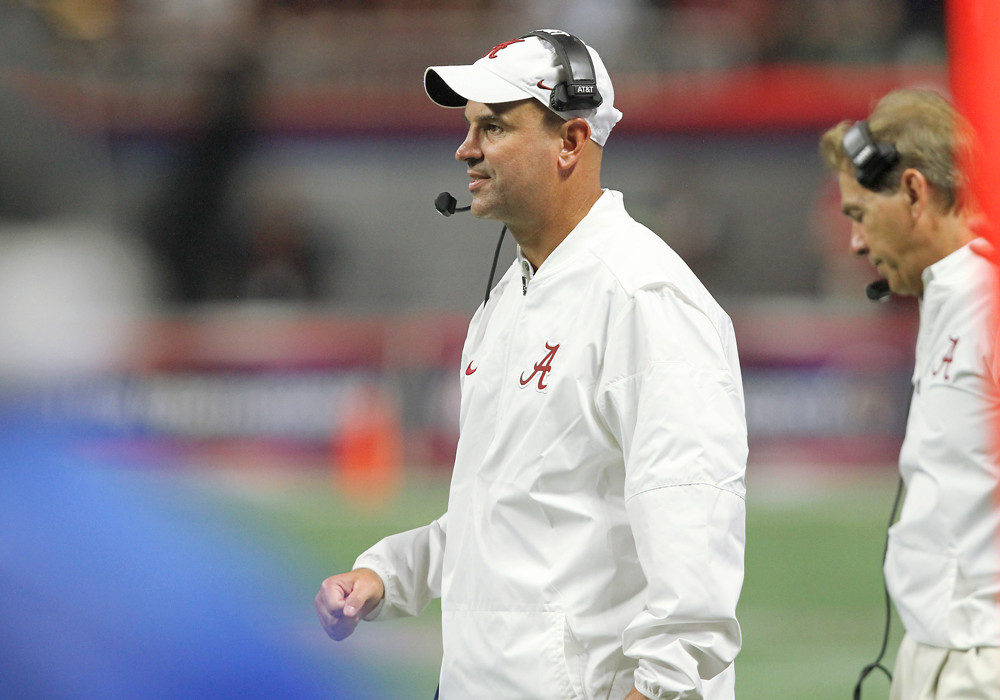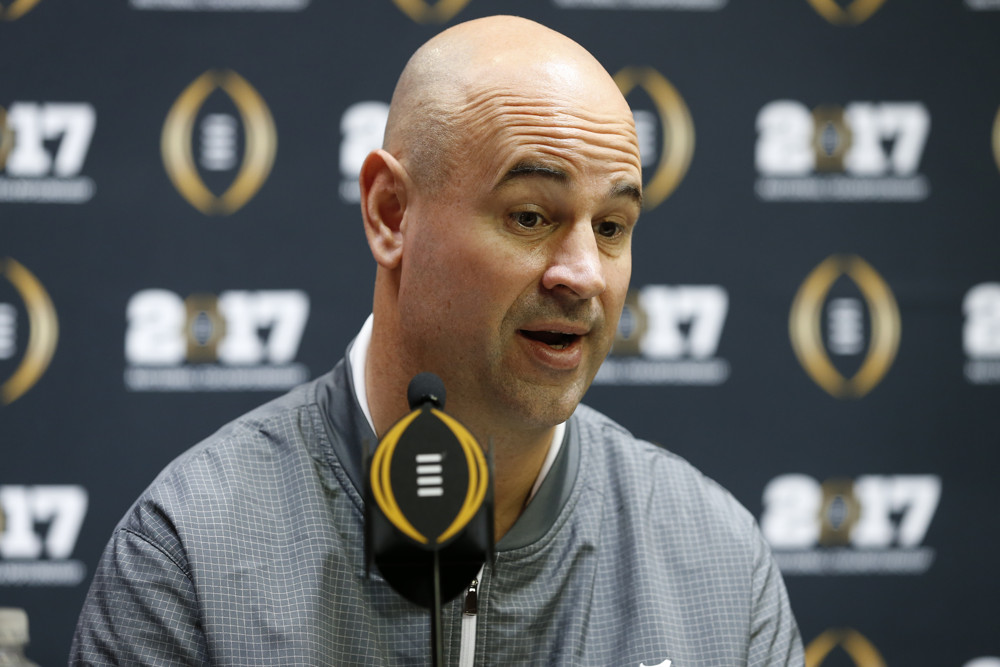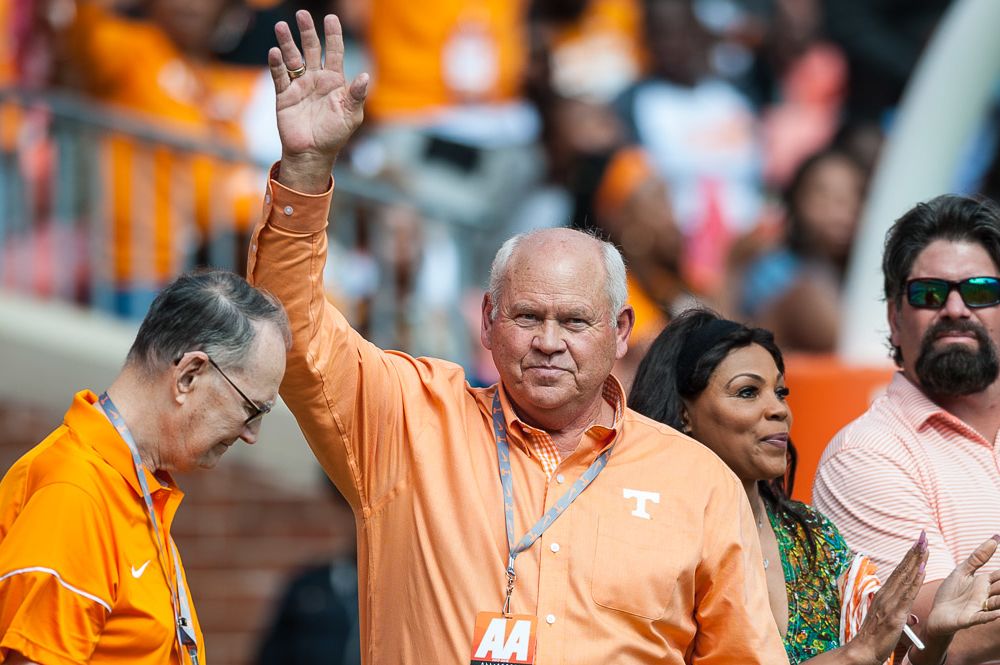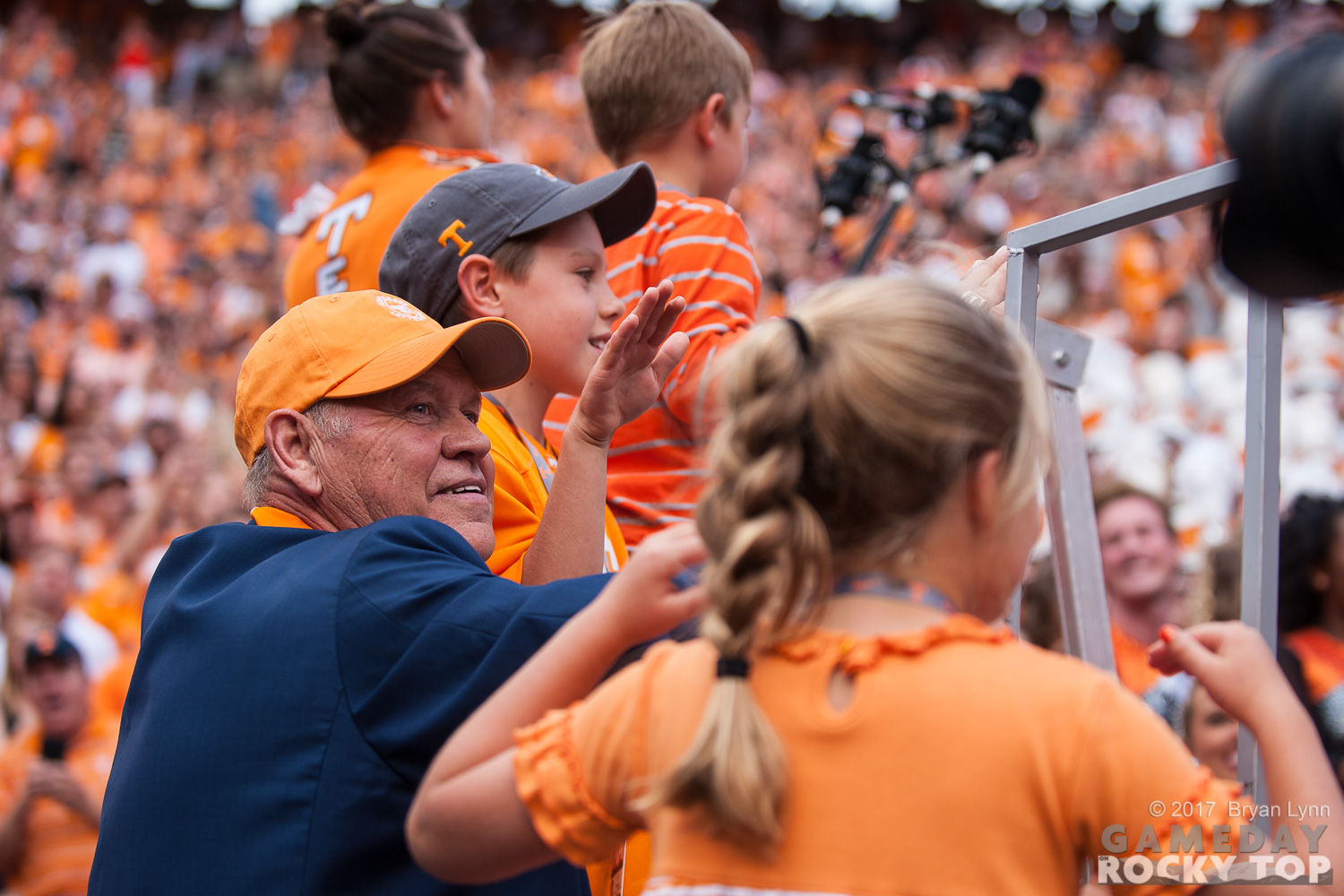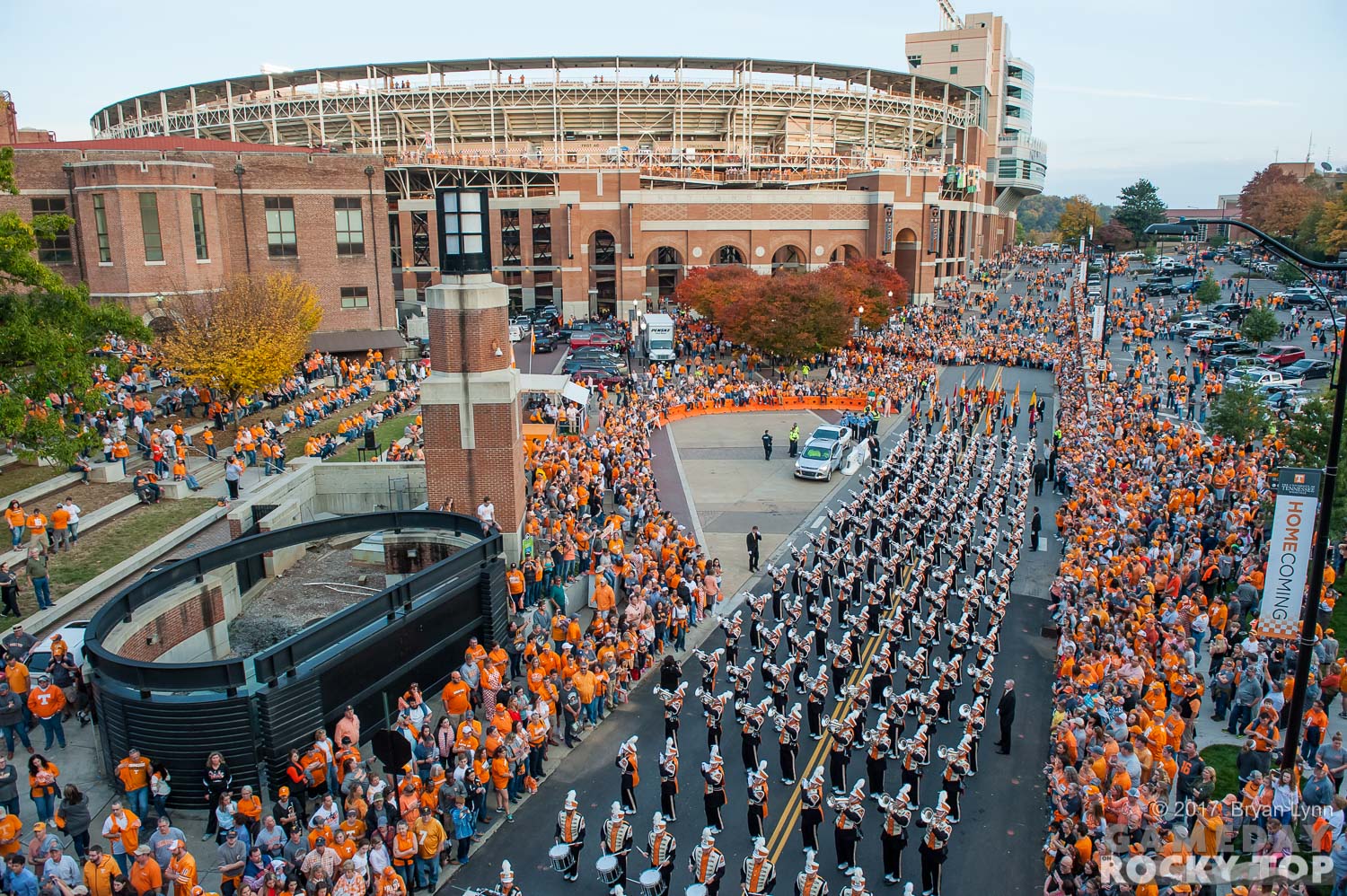Join Will, Brad, and I as we talk about Tennessee’s brand spanking new head football coach Jeremy Pruitt? We’re doing this one live, so you can listen in real time using the sometimes magic orange widget below and even participate in the comments, which we’ll try to keep up with as we’re talking.
Category Archives: Football
New Tennessee Football Coach Jeremy Pruitt Seems to Fit Just Fine
As new Tennessee football coach Jeremy Pruitt stood in front of an orange-clad contingent to be introduced Thursday, he told an anecdote about starting his career as an elementary school P.E. teacher in Fort Payne, Alabama.
Pruitt joked that, from a stretch between 2001-04, he taught every kid in that community how to tie their shoes.
Through the past 15 years, Pruitt has experienced a meteoric rise to make it to the top of his own college football program, but his job in Knoxville won’t be too dissimilar to that first one long ago.
It may be more difficult, but Pruitt is going to be charged with teaching the Vols on campus and the ones coming how to win. For a woebegone program, that may sound a lot tougher than tying shoes, but the reason why it may not be for Pruitt is simple:
The man has won football games everywhere he’s ever been, and he’s surged to where he is because of what he’s done.
Yes, to say he “won the press conference” would be the biggest cliche imaginable. After all, they all do, don’t they? But, for Tennessee fans sick of hearing about life championships, five-star hearts and other canned comments from a coach as robotic as Butch Jones, Pruitt is a breath of fresh air.
It’s almost like you expect the man in the bent-billed cap to slip a fishing hook on the bill, slide in a dip, sit there and shoot the breeze with you about a little ‘ball. That’s exactly what he did on Thursday, and he connected with us all.
From the story about his Daddy slipping off his belt and whipping him when he was young and suggested how his dad’s high school team could have won to when he stopped what he was doing to thank his wife because he’d forgotten to do that the last time he spoke in public, Pruitt came off as genuine. It’s because he is. He’s one of us, no matter what color cap he wore growing up or how many “script A’s” he has in his wardrobe.
Growing up on the Tennessee-Alabama line, I’ve got just as many buddies who pull for the Crimson Tide as the Vols. They may be a little misguided, but it doesn’t make them bad people. They’re just a bunch of good ol’ boys like me who want to sit around and talk ball, fuss at each other about it and hold bragging rights. I’m on an e-mail thread with a bunch of them right now, and we argue all day, every day, mostly about UT and UA.
Pruitt would fit right in.
So, when he says: “I’m charging everybody associated with this university to get our hands out of our pockets, let’s roll our sleeves up and get ready to go out in the streets with everybody else in the SEC,” you find yourself believing it, wanting to do it, feeling that’s what it takes to get out there and work hard enough to make what you want to happen, happen.
Of course, for Pruitt and the Vols, that is winning championships. It may seem so far away, but Pruitt didn’t give any time limits on Thursday. There was no, “It’ll take seven years to build a program,” malarky. A man who has been a part of four national championships answered as clearly and honestly as he could when asked what it would take for UT to get back to winning championships and how to get there.
“You’re saying, ‘Can we get there?'” he said to Nathanael Rutherford of Rocky Top Insider, who asked the question. “I wouldn’t be here if I thought we couldn’t get there; I’ll tell you that right now.”
So, how does it happen? If you are a Tennessee fan and listened to Pruitt’s press conference, you know two things: No. 1, MOTHER OF THOR HE SOUNDS LIKE NICK SABAN. How many “aight’s” can you fit into a soundbite? Now, swallow hard and take a deep breath, maybe go wash the taste out of your mouth because No. 2 (and most important is) he works like Nick Saban, too. He learned under Saban in three defensive capacities, and he played for Gene Stallings. He also coached for Mark Richt and Jimbo Fisher. Phillip Fulmer, as Pruitt noted, is just down the hall.
That’s a lot of great minds around him for Pruitt to just sit down and talk ball. You know he has, and you know he will. It’s obvious Pruitt is driven to win, and having been around Saban — no matter what you say about him — there’s no way you can’t be around the greatest college coach of all time and not have some of it rub off.
Sure, that fell through with Derek Dooley, but Pruitt is a laser-focused recruiting machine, intense on the field and off it, and the coaches lining up to coach on his first staff at Tennessee and the top-shelf, elite players he’s recruited in his time as an assistant are clear indicators that this isn’t the same.
“Make no bones about it,” UT chancellor Beverly Davenport said, “he told me he wanted to win championships. And I told him, ‘Make no bones about it, Tennessee expects you to.'”
He expects championships, and that’s what he’s going to try to do at Alabama before he starts full-time in Knoxville. He noted that he’ll coach and recruit for UT until the dead period starts, head back to Tuscaloosa to coach the Tide in the playoffs and then come back to Knoxville after the College Football Playoffs are over.
“I work for the University of Tennessee, I’m all in for the University of Tennessee until the dead period,” he said. “We’re going to recruit, I’m going to work as the head football coach at the University of Tennessee, and we’re going to do what we can do to start going in the right direction.
“Now, I also have a commitment to the kids I sat in their home with their parents and recruited them to go to the University of Alabama. Coach Saban has been wonderful to me; I wouldn’t be here today without his help, so I’m going to go back when the dead period starts, and I’m going to coach those kids.”
In between Pruitt talking about his intensity, we got some glimmers of what he wants to do from a schematic standpoint. He didn’t talk much about it besides being balanced on offense, letting the run dictate the pass, and being aggressive on defense. He also wouldn’t commit to running a 3-4, only saying he’d play to the team’s and players’ strengths.
We all know he’ll run a 3-4 when he gets his players in, but Thursday wasn’t the day to talk about all that. Pruitt said his vision is for Tennessee to be “big, fast, dominating, aggressive, and relentless football team that nobody in the SEC wants to play.” Obviously, that wasn’t the case during the Jones era where players seemed to be made of chipped glass and missed games for the tiniest ailments. The strength-and-conditioning failures under the previous regime ultimately doomed it, and Pruitt seems to understand just how vital that aspect is to winning. Coming from Tuscaloosa where Scott Cochran has the Crimson Tide players looking like cyborgs, would you think otherwise?
We know Pruitt bled crimson his whole life, but he also has Tennessee roots, too. He played briefly at Middle Tennessee State. His father coached for Marion County High School for a span, and though he grew up on Sand Mountain, he mentioned running through the T, Smokey and the coaching tenures of Coach Robert Neyland, Coach Doug Dickey, Coach Johnny Majors and Coach Fulmer. None of that was rehearsed. When you grow up in a football family, you know football.
Pruitt knows football, and while he may have been dyed in the wool Alabama, Tennessee is now “his” program.
“My name will be on this program,” Pruitt said. “If my name’s on it, I’m all in. I’m going to be involved in everything.”
A good, ol’ Southern boy talking about the importance of his name? If that ain’t something we can get behind, what is?
The bottom line is Pruitt can’t win anything on Thursday. It’s crazy to think that he can win the biggest prize for Tennessee’s most hated rival while he’s Tennessee’s head football coach, but that’s the nature of the beast right now. Whether you want the Crimson Tide to win or not in the next month, it’s more “leadership reps” — check that — CHAMPIONSHIP reps for a man charged to lead the Vols out of the doldrums and back into the spotlight.
We can sit here and discuss what all needs to happen, who we need to get, what we have to do and everything that stands in our way of winning big again in the SEC, but that’s not Pruitt’s style. He’s going to get out there and get his hands dirty, go out into those streets and work for it. He’s going to sit down with Tennessee’s players who just endured the worst season in program history, and he’s going to get back to basics.
He’s gonna go tie some shoes.
“Instead of talking about what we want,” Pruitt said, “let’s figure out how to get there.”
Fulmer stood in front of the congregation at the beginning of the press conference talking about how he needed to find the “right person,” the perfect fit for Tennessee.
“My charge from the chancellor, my obligation to our alumni and our great fans and especially to our former and future players who have or will pour their hearts into the program was to go find the best coach to get our proud football program back to the level of its championship tradition,” he said.
That search looked past Pruitt’s crimson and into the core of what makes him a leader, a winner and a builder. He doesn’t need any cliched bricks. Pruitt uses real talk, and he’s backed it up with real results.
It’s UT’s hope that continues as he puts his own fingerprints on a once-proud program.
Tennessee head coach Jeremy Pruitt’s introductory press conference live stream
Tennessee will be holding a press conference to officially welcome new head coach Jeremy Pruitt this evening at 6:05. The video stream is embedded below so we GRTers can watch it and talk about it right here. I’ll be doing my best to paraphrase on the fly in the comment section below for anyone who’s not able to watch the video.
Brad will be along shortly after the press conference concludes with his recap and thoughts, and then he, Will, and I will be recording a live-streamed podcast starting at 8:30.
So, watch for all of that here tonight. It’s been a good day on Rocky Top, and even better days are ahead.
Report: USC’s Tyson Helton to be Tennessee’s Offensive Coordinator
Jeremy Pruitt works fast: VolQuest is reporting Southern Cal passing game coordinator Tyson Helton will be Tennessee’s new offensive coordinator. He will lead an offensive staff including Robert Gillespie staying on with running backs, and Colorado State offensive coordinator Will Friend coming aboard as offensive line coach, plus a familiar face in the secondary:
Jeremy Pruitt already putting together Tennessee staff. As reported by Volquest, USC passing game coordinator and QBs coach Tyson Helton will join him along with Colorado State OC/OL coach Will Friend, Colorado State DB coach Terry Fair and Tennessee RB coach Robert Gillespie.
— Chris Low (@ClowESPN) December 7, 2017
Tyson Helton is the younger brother of the Trojans’ head coach Clay Helton. He has served as USC’s passing game coordinator the last two years.
This is a strange twist of fate for Tee Martin, no doubt, who serves as USC’s offensive coordinator. The former Vol didn’t appear to be among the finalists for Tennessee’s head coaching vacancy, and now one of his colleagues heads to Knoxville as offensive coordinator.
I have no idea what kind of head coach Tee Martin would be; I hope a tremendous one. But Tennessee’s previous coaching staff serves as somewhat of a warning for hires of convenience or friendship. Butch Jones brought almost his entire staff from Cincinnati to Knoxville initially, then made comfort hires at offensive coordinator when change presented itself. Mike DeBord never got the benefit of the doubt at Tennessee, in part for this very reason; he orchestrated the best offense in college football last November. But Larry Scott’s promotion was disastrous for Tennessee and ultimately for Butch Jones. A failure to operate outside of comfort zones on offense and/or the elevation of recruiting over scheme handcuffed Tennessee’s offense.
Tyson Helton is a move in a different direction, in what may be Pruitt’s most important hire.
As Southern Cal’s passing game coordinator, Helton led the Trojans to the eighth-best passing offense in S&P+ this year (see USC’s full advanced statistical profile at Football Study Hall); they finished fourth nationally in the same metric last year. Sam Darnold is eighth nationally in yards per attempt among QBs with 300+ attempts. Helton and Martin obviously did a good job helping Darnold position himself as one of the top picks in the 2018 NFL Draft.
Before joining his brother at USC, Helton worked with another name Tennessee fans have salivated over in the past two weeks: he was the offensive coordinator under Jeff Brohm at Western Kentucky.
Brohm has been the play-caller at WKU and Purdue, an important point. But Helton’s role as offensive coordinator and quarterbacks coach helped produce incredible offenses in 2014 and 2015. In 2015 the Hilltopper offense finished fourth nationally in S&P+ (see Western Kentucky’s advanced statistical profile), third in yards per play, and third in points per game. They were fifth and sixth nationally in those last two categories in 2014.
Helton has studied under Brohm and coached a potential number one overall draft pick alongside Tee Martin. Now he’ll get his chance in a bigger role with play-calling responsibilities. It’s a big hire for Jeremy Pruitt, but I like the background, the willingness to go outside the familiar, and the emphasis on scheme.
The Bricks and The Ceiling
I’ve already been wrong about Jeremy Pruitt once. Fourteen months ago, #9 Tennessee and #1 Alabama played the highest-ranked Third Saturday in October ever. The Vols had just dropped 684 yards on Texas A&M, and touched up Georgia’s defenses for 920 yards and 70 points in their last two meetings with Pruitt. Despite a number of injuries against the Aggies, I thought the Vols would beat Alabama and continue their magical season, based largely on what I thought Tennessee’s offense would do against Alabama’s defense.
Instead, most of those injured players didn’t return, and Alabama held Tennessee to 163 yards and 2.59 yards per play. It was the worst yards per play performance by a Tennessee offense in the last ten years…until we played Alabama this year, and got 2.35.
The magic ran out for Tennessee on that October day in 2016, and indeed for Butch Jones too. It peaked between the hedges two weeks earlier and at least a dozen narratives ago. After starting 5-0 last year, the Vols are 8-12 in their last 20 games. And the team on the other end of that hail mary looks mighty fine today.
What’s behind the emphasis on defense and discipline?
I’m sure Kirby Smart’s success made all three of Tennessee’s finalists more appealing; Georgia’s head coach would have no doubt been mentioned in the press conference as an example of what could be had the Vols hired Kevin Steele or Mel Tucker, and you can expect to hear it when they’re introducing Jeremy Pruitt. But I wonder if something else was in Tennessee’s motivation to lean in that direction – it was John Currie’s first choice too with Greg Schiano – and not, we know now, because Tee Martin was guaranteed to come in on the offensive side of the ball.
Coaching hires are indeed pendulum swings, so it makes sense to hire a defensive coach after five years of the Butch Jones offense. But the more pressing need (and the more apparent one to those behind the scenes, perhaps) may have been discipline and roster management. How many talented players in significant roles failed to finish their careers at Tennessee under the previous administration? It wasn’t just the weirdness of Jalen Hurd’s story. There’s a long list from Marquez North to Jauan Jennings.
Butch Jones knew how to recruit elite talent, but coaching it and keeping it were not his strong suits. This was an unchecked box for some candidates as well, but having spent the last five years as the defensive coordinator at Florida State, Georgia, and Alabama, it does not appear to be an issue for Jeremy Pruitt.
Are we better off?
The default position for Tennessee fans will be, “Yes.” And I might agree even if I wasn’t one.
Moving on from an athletic director who was so out of touch with both football and the fan base that Greg Schiano was his go-to choice, then replacing him with Phillip Fulmer? That still feels like a win on its own. Is Tennessee better off with Fulmer and Jeremy Pruitt than they would have been with Currie and Mike Leach? I don’t know how that answer will play itself out on fall Saturdays in the near future. But considering Leach was the emergency option for Currie only after missing on Dave Doeren? I would still take Pruitt and Fulmer’s leadership.
I remain hopeful Tennessee’s revolt against the Schiano pick and the resulting power shift will be a good thing long-term. In the short-term, Pruitt is as good as Tennessee and Fulmer had any right to do after this crazy set of days.
A ceiling hire
There are no sure things in this business, and throwing money at the problem is no guarantee. Florida State, one of the few jobs clearly better than ours even when we are at our best, just hired a coach who was in the third tier of many of our initial hot boards. And they hired him in a hurry. Some Tennessee fans better hope they were right about Dan Mullen.
However, even unable to lure a proven winner, even after a fan uprising and a change in athletic director, and even after the worst season in program history…Tennessee still made a ceiling hire. And I’m very impressed with this.
The Vols could have taken the safe option and hired Les Miles, or the easy option and hired Tee Martin. Both would have been very well received initially and sold their fair share of tickets. But the Vols, despite everything, still made a hire with their eyes on the biggest prize. Credit Fulmer, who would know about such things.
To be clear, there are risks. It might be that Jeremy Pruitt is an excellent defensive coordinator and a lousy head coach. We don’t know. Butch Jones had a higher floor (or so we all thought at the time). But Pruitt has a higher ceiling than both Jones and Derek Dooley on the day they took this job. And he probably has a higher ceiling than Les Miles in 2017.
This search was a mess. It will take time to fully digest, and it will stay in the news, and not just because of lawyers. If Pruitt struggles early or often, Tennessee fans will get some of the blame. That narrative is already alive and well and will be convenient for some in the national media to return to. The same unity that sparked all of this will be necessary in the months ahead.
But at the search’s end, Tennessee still hired a coach it believes can win the biggest prize here. I’m not sure they could say that with a straight face at the last two press conferences. And since it will be Fulmer’s face this time, there’s all the more reason to believe it.
Reports: Tennessee Finalizing Deal with Alabama DC Jeremy Pruitt to be new Head Coach
After a coaching search that felt like it spanned generations, took years off lives, ended jobs, tarnished reputations, caused power struggles between a major university’s boosters and administrators — as well as power struggles between most orange-clad men and the wives angry that they’d become married to their F5 buttons — the Tennessee Volunteers finally maybe, probably, hopefully have their man.
We think.
Possibly.
According to multiple reports from ESPN’s Mark Schlabach, Chris Low and Brett McMurphy to GoVols247’s Patrick Brown to VolQuest’s Brent Hubbs to everyone else in the free world with a Twitter account and a source, the Vols will name Alabama defensive coordinator Jeremy Pruitt as head coach on Thursday.
Barring any snags.
Vols are expected to name Alabama defensive coordinator Jeremy Pruitt as their new coach tomorrow, barring an unexpected setback https://t.co/zvuSfR8Kxm
— Mark Schlabach (@Mark_Schlabach) December 7, 2017
Schlabach also reported this hiring likely means the end of any chances USC offensive coordinator Tee Martin returns home to Knoxville at this time.
USC offensive coordinator Tee Martin, a former Tennessee quarterback, who guided the Volunteers to the 1998 national championship, is not expected to return to his alma mater as offensive coordinator, sources told ESPN. Martin was contacted by UT… https://t.co/bmACWGrkyd
— Mark Schlabach (@Mark_Schlabach) December 7, 2017
It’s important to note the caveat that nothing is COMPLETELY finalized yet, considering the “snag” Ohio State defensive coordinator Greg Schiano encountered two Sundays ago, the “snag” that made Purdue coach Jeff Brohm’s name magically disappear and the “snag” that obliterated a verbal agreement for Mike Leach to come to UT.
If none of the snags occur that have basically turned this Tennessee search into a minefield over the course of three weeks, Pruitt will be the new head man in orange. He’s the culmination of a five-day search since Phillip Fulmer took over as athletic director following John Currie’s firing.
Fulmer dipped his toe in the water on Gary Patterson, Chris Petersen and Justin Fuente reportedly, but didn’t get much reception. Once that happened, his search mostly focused on three SEC defensive gurus and SMU offensive-minded head coach Chad Morris, the former Clemson offensive coordinator.
The Morris flirtation didn’t progress as far as the other three, and he took the Arkansas job on Wednesday. Fulmer, meanwhile, conducted multiple interviews with old friend, former Tennessee linebacker and Auburn defensive coordinator Kevin Steele, Georgia defensive coordinator Mel Tucker and Alabama DC Pruitt.
If the search ultimately yields Pruitt, it’s a win for the Vols when it looked like there was no way this search could finish with one. Without question, no matter how great it was that #VolTwitter, fans and students banded together to stop the Schiano hire, it helped perpetuate the idea of a difficult environment in Knoxville.
The toxicity continued as Currie went rogue following failed attempts to hire Oklahoma State coach Mike Gundy, perhaps Brohm and definitely N.C. State coach Dave Doeren. He reportedly took a former Kansas State booster’s plane to the West Coast to interview Leach, was ordered home by UT chancellor Beverly Davenport and fired on the spot last Friday morning.
Fulmer’s search began, and he took some big swings before settling on a trio of tough, defensive-minded coaches with SEC roots and strong recruiting resumes. Perhaps the strongest was Pruitt’s, who knocked his interviews out of the park and ended up the main focus.
Now, if his name actually somehow finds paper in the morning and this thing is official, the focus will be on the coaching staff and recruiting. Can Pruitt bring with him any of Alabama’s marquee commitments he was recruiting? Can he somehow convince Tosh Lupoi to join him in Knoxville rather than being the next in line to be ‘Bama’s defensive coordinator? If not, will the focus zero in on Georgia’s linebackers coach Kevin Sherrer?
Is there any truth to the rumors that Pruitt could bring with him old buddy Chip Lindsay to be Tennessee’s offensive coordinator after just one (successful) season as Gus Malzahn’s coordinator at Auburn? Will former Arkansas offensive coordinator Dan Enos get a look in Knoxville?
If Pruitt deal is finalized: Names to keep an eye on for Vols staff include CSU’s Will Friend, ASU’s Billy Napier, UGA’s Kevin Sherrer, UAB’s Brian Williams and Tracy Rocker. Robert Gillespie a possibility to stick around, too. Rush Probst is a wildcard to watch.
— Jesse Simonton (@JesseReSimonton) December 7, 2017
There is still a lot of intrigue remaining in all this, but it looks [at least right now] like Tennessee got its head man after a long, national embarrassment.
Finally.
Now, just don’t go screw it up, Vols.
Current Tennessee coaching candidate blind taste test
When Phillip Fulmer took over as Tennessee’s athletic director last Friday, the Vols didn’t just hit the reset button on their coaching search, they mashed it a good one. Suddenly, we went from lists that included scores and scores of names and media outlets that all said something different to most media members reporting the same smaller handful of names. Maybe the chef has assumed sole command the kitchen so he could cook up something palatable to the starving masses.
Word is that Fulmer is wanting to make a decision by the end of the day today. If that’s true, we should know something soon after that, perhaps by Thursday. For now, though, let’s compare the short resumes of the guys that appear to be in the running and see how everything looks when you’re not focusing on their names.
Coach 1
- Head coach, second-level program for three years
- Coordinator, top-level program for four years before that
S&P+ as head coach
- 2017: 60 (8/93)
- 2016: 90 (72/126)
- 2015: 103 (63/74)
S&P+ as coordinator
- 2014: 76
- 2013: 12
- 2012: 14
- 2011: 25
Recruiter Rankings
- 2017 (head coach, second-level): Not in the Top 500
- 2016 (head coach, second-level): Not in the Top 500
- 2015 (head coach, second-level): 427
- 2014 (coordinator, top-level): 75
- 2013 (coordinator, top-level): 76
Coach 2
- Head coach, top-level program for 11 years
S&P+ as head coach
- 2016: 4 (22/3)
- 2015: 11 (14/28)
- 2014: 20 (58/9)
- 2013: 13 (14/28)
- 2012: 11 (36/7)
- 2011: 1 (13/2)
- 2010: 15 (42/3)
- 2009: 12 (37/9)
- 2008: 24 (28/34)
- 2007: 2 (13/3)
- 2006: 5 (12/6)
- 2005: 9 (29/10)
Recruiter Rankings
- Not in the Top 500 for any year on record
Coach 3
- Coordinator, two top-level programs for three years
S&P+ as coordinator
- 2017: 5
- 2016: 9
- 2015: 28
Recruiter Rankings
- 2017: 453
- 2016: 267
- 2015: N/A
Coach 4
- Coordinator, two top-level programs for three years
S&P+ as coordinator
- 2017: 8
- 2016: 35
- 2015: 1
Recruiter Rankings
- 2017: 20
- 2016: 18
- 2015: N/A
Coach 5
- Coordinator, three top-level programs for five years
S&P+ as coordinator
- 2017: 3
- 2016: 1
- 2015: 11
- 2014: 16
- 2015: 7
Recruiter Rankings
- 2017: 149
- 2016: 71
- 2015: 37
- 2014: 36
- 2013: 1
Coach 6
- Coordinator, one top-level program for six years
S&P+ as coordinator
- 2017: 2
- 2016: 6
- 2015: 6
- 2014: 1
- 2015: 41
- 2014: 62
Recruiter Rankings
- 2017: 40
- 2016: 6
- 2015: 35
- 2014: 227
- 2013: 44
Coach 7
- Coordinator, one top-level program for two years
S&P+ as coordinator
- 2017: 15
- 2016: 12
Recruiter Rankings as coordinator
- 2017: 11
- 2016: 1
Recruiter Rankings as position coach
- 2015: 2
- 2014: 2
- 2013: 92
My Results
Just going off these numbers, as much as I can do so blindly after having done the research, here’s the way I think I’d rank them:
- Coach 2 — Head coaching experience at a major program over an extended period with excellent overall results. Not listed as a recruiter anywhere, but presumably his staff could recruit.
- Coach 5 – Five years as a coordinator, and excelled all five years. Did it at three different programs, so it’s not a fluke. Also a solid recruiter.
- Coach 6 – This guy is basically the same as Coach 5, except he’s only done it at one place.
- Coach 4 – A coordinator at two major programs with excellent numbers and elite recruiting to boot.
- Coach 7 – Basically Coach 4 with one year less experience, but arguably with even more promise, both in stats and recruiting ability.
- Coach 3 – This guy is Coach 4, but with worse recruiting.
- Coach 1 – Head coaching experience at a second-tier program after four years as a major program coordinator. As a coordinator, he looked much like the other coordinators on the list, but recruiting wasn’t elite. As a head coach, he has decent numbers on one side of the ball in his third year, but not on the other.
That’s how I’d rank them at this time. What do y’all think?
Here’s the key:
- Coach 1: SMU head coach Chad Morris (formerly OC of Clemson)
- Coach 2: Former LSU head coach Les Miles
- Coach 3: Auburn defensive coordinator Kevin Steele (formerly DC of LSU)
- Coach 4: Georgia defensive coordinator Mel Tucker (formerly DC of Alabama)
- Coach 5: Alabama defensive coordinator Jeremy Pruitt (formerly DC of Georgia and FSU)
- Coach 6: Clemson defensive coordinator Brent Venables
- Coach 7: USC offensive coordinator Tee Martin
Feels Like Home
When Tennessee’s search came up empty in Raleigh on Thursday morning, it seemed like two options were available. The Vols could press pause, take a breath after the events of an unprecedented week, and reset the board. Or the Vols could press on, try to make a hire as quickly as possible to change the narrative, and “settle” for a down-the-board unproven.
Thursday afternoon, John Currie instead went for door number three: let’s get Mike Leach, and let’s get weird. In their desperation, they turned to a man they didn’t fully understand. And what a grand experiment this would have been.
Then on Friday morning, weird and unprecedented collided head-on. And on Friday afternoon, at the end of our most insane week at the end of our most insane decade…on Friday afternoon, Tennessee found its way home.
To be clear, the house needs a lot of work. The brick-by-brick renovations looked good for a moment, but ultimately had to be torn down. But today, Phillip Fulmer is the athletic director, and Tennessee feels like home.
This has to be the culmination of the insanity.
We throw “rock bottom” around too often; at the end of the program’s first 4-8 season it’s easy to do. The Vols may continue to struggle on the field in the short-term, and no athletic program of this size and stature runs without drama. But if Tennessee is going to move forward in a meaningful way, Friday has to be the end of the madness.
Tennessee forced Fulmer out at the tail end of the 2008 season, one year after he won 10 games and his fifth division title. They replaced him with Lane Kiffin. Since then:
- Kiffin left in the middle of the night to take the Southern Cal job after just one season in January 2010.
- The Vols hired Derek Dooley fresh off a 4-8 season at Louisiana Tech.
- Bruce Pearl took the basketball program to its first Elite Eight in March 2010, then lost his job one year later, in part for lying about a photograph taken at a BBQ, for which he received a three-year show cause.
- Derek Dooley was fired after three years by Dave Hart, who replaced Mike Hamilton as athletic director. The Vols had Charlie Strong, then didn’t, and ended up hiring Butch Jones.
- Cuonzo Martin took the Vols to the Sweet 16 in 2014, then left for California after a low-ball offer from Dave Hart, who chose not to denounce an in-season petition for Bruce Pearl’s return.
- Hart hired Donnie Tyndall in April 2014. In November, the NCAA announced an investigation into his time at Southern Miss. He was fired after one season in Knoxville.
- Hart retired, in part due to the university’s involvement in a Title IX lawsuit alleging a culture of rape at Tennessee, as did chancellor Jimmy Cheek. Beverly Davenport replaced Cheek, then hired John Currie to replace Dave Hart.
- Butch Jones signed a pair of Top 10 recruiting classes in 2014 and 2015, but coached that talent to only a pair of 9-4 seasons in 2015 and 2016. Tennessee lost to Florida in inexplicable fashion in 2014, 2015, and 2017, failed to win the SEC East despite beating Florida and Georgia in 2016, and missed a chance to make a New Year’s Six bowl by losing to Vanderbilt. In 2017 the Vols fell apart and finished 4-8 for the first time in program history. Jones was fired.
And then, this week.
People smarter than me, including Phillip Fulmer, will tell you Tennessee has suffered on the field and court in large part because they suffered in the board room: the administration, the athletic department, and influential boosters playing too much tug-of-war. With Fulmer at the helm in the AD, Tennessee must start exerting the majority of its might toward the same goals. And Fulmer at the helm gives Tennessee a better chance to do so than we’ve seen in the last decade.
The long-term became more important this week.
When Tennessee lost to South Carolina and change was moving from possible to probable, this still seemed like a short-term fix. Tennessee’s senior class is small and there are still plenty of recruiting stars on the roster, unlike the turnover we saw from Kiffin-to-Dooley and Dooley-to-Butch. The Vols won nine games in 2015 and 2016, and were ranked for the first three weeks of this season. Hire the right coach and they might come in and sustain the level Butch Jones enjoyed, then hopefully level up.
Since then the Vols lost to Kentucky and were non-competitive in the second half with Missouri, LSU, and Vanderbilt. Two offensive linemen who would have been starters next year will no longer be on the team in 2018, plus a five-star legacy lineman opened up his recruitment. A legitimate conversation about whether to keep Butch Jones if he went 8-4 quickly turned into a 4-8 season, and an understanding that whoever was next would have multi-year work to do to get Tennessee back.
But as this week spiraled out of control, it became clear Tennessee’s long-term future was at stake. And it became clear this wasn’t a problem to be solved simply by making the right hire for the football team.
Friday morning, it felt like Tennessee football was more vulnerable than at any point in my lifetime. Even when the Vols hired Derek Dooley and you knew things would be bad for a couple of years, Tennessee was still just two seasons removed from an SEC East title and eight years removed from the doorstep of the BCS Championship Game. The program was relevant in a way that could (and did) survive Dooley, and survive a three-year recruiting failure from 2007-09.
But now, on the heels of 4-8 and with such instability in the athletic department, Tennessee’s long-term future was in jeopardy. At the end of a difficult decade, the perception quickly became that continuing to march to the beat of the same drum – one that thought Greg Schiano was the best option – would prevent Tennessee from getting healthy. And thus Currie is out, Fulmer is in, and the Haslams’ power seems diminished, with fan voices singing their approval.
An underrated variable in this whole equation is timing, something which finally worked in Tennessee’s favor in basketball when Rick Barnes became available as Donnie Tyndall was fired. What if Jim McElwain squeaks out those games against LSU and Texas A&M in October, and Florida doesn’t decide to make a change? Is Dan Mullen the coach in Knoxville on Sunday, and all of this mess is simply avoided?
This is the biggest question: is what happened this week a good thing for Tennessee long-term? If the problems on The Hill were indeed systemic, changing the balance of power at the top could be a win for Tennessee even as they take a loss in the short-term. That loss has already come in the national media, though their news cycles get continually shorter. That loss may also come on the field for a season or two. But is Tennessee better off today, with Phillip Fulmer at the helm, the fan voice registering, and everyone given a new chance to pull in the same direction? The answer could be yes even if the alternatives were Jeff Brohm, Mike Leach, or another coach we liked working under the previous system.
Faith returns, hope awaits, love abides
This week I have been more grateful than ever for the teams I love (the Celtics and, for a very long time, the Braves) that are well-run organizations. Growing up with the 80’s Celtics, the 90’s Braves, and the Majors/Fulmer Vols, it was easy to have faith in your team and assume they would make good decisions, giving them the very best chance to win.
At Tennessee, I think much of this faith endured among the fan base even when the first half of the last decade could be blamed on circumstance. When the Vols ended up with Butch Jones instead of Charlie Strong five years ago, faith wavered but love remained. Tennessee fans showed up for Teams 117-121.
But it became clear on Sunday fans did not believe in those with decision making power. This could have been a helpless feeling, and perhaps is in other situations it would be; what do you do if you’re, say, a Cleveland Browns fan?
But after a week of raised voices and real threats to stop showing up – in person and in the university’s bank account – a change sparked by a unified fan voice has given us a leader we can believe in. And once more, faith stirs.
We will see about hope. We noted in the middle of last week that despite a lack of faith in this administration, they still might land a coach to provide some degree of hope. Tennessee tried to rebound with Mike Gundy, then Jeff Brohm, then went to a coach who would have struggled in this department in Dave Doeren. Some of the names from previous hot boards might get a second call, others could move up the ladder, and perhaps Fulmer has a surprise or two up his sleeve. Hiring hope can still make a real difference in ticket sales and patience.
But at the end of a remarkable week and the start of a new chapter in Tennessee athletics, love remains. Love for Tennessee was behind the voices lifted in protest on Sunday, and love for Tennessee brought Fulmer to the big chair. The house needs work, and the family may still bicker about the best way to do it, as only family can. But love for Tennessee remains our unifying factor. We will need it, and we will need to continue to pull together in the same direction before we can make room for another trophy case.
But for now, it feels good to be home. On Friday night, there was finally a chance to rest in this search. My wife and I went out to dinner, and I grabbed an orange hat on my way out the door. It felt better on my head than it had in a long time.
Go Vols.
Chaos’s Reward? The Return of Phillip Fulmer: Oh Captain, My Captain
More than nine years ago, an emotional Phillip Fulmer rode out of the Tennessee spotlight on the shoulders of his players after a career where he went 152-52. Though it had been a tumultuous final season, he exited with a win.
On Friday, Fulmer came back in on his proverbial white horse to be the UT athletic director and potential savior of a woebegone football program that has endured so much losing, embarrassment and dysfunction over the time since he was forced out that it seems like it was the program’s penance for letting him go.
All of that came to a head this week in what has played out like a daytime soap opera meets college football passion meets Game of Thrones.
In case you’ve been making moonshine in the mountains this week, here’s my quickest possible summary:
After an outpouring of indignation following the leaked announcement that John Currie, the Haslams and the rest of their cronies were going to force Greg Schiano down our throats as Tennessee’s new head coach, UT’s fan base revolted. By Sunday’s sundown, Tennessee rescinded the offer.
While that reaction was justified, the national media responded with a trailer-park frenzy of its own. The dominoes that scattered to the floor the remainder of the week amounted to warring, internal strife within the athletic department puppets and the Board of Trustees.
Long-time UT offensive assistant David Cutcliffe declined to leave Duke and try to help fix things. Then, Currie threw a bunch of money at Oklahoma State coach Mike Gundy who spurned Tennessee for the second time to stay home and coach the Cowboys.
UT spoke to SMU coach Chad Morris, though an offer was never made, and the search turned its focus toward Purdue coach Jeff Brohm. Jimmy Hyams reported Brohm would be the next head coach, but news trickled out that the UT administration balked at Brohm’s buyout. Other media outlets said the Vols never offered.
After the Brohm “did-he-or-didn’t-he” fiasco, N.C. State coach Dave Doeren was the focus and actually had an offer. Tennessee fans, by this time brimming with anger, went the irrational route and implored Doeren on Twitter that we didn’t want him. Doeren accepted a raise to stay in Raleigh. Then, under the veil of secrecy, Currie flew to the West Coast where he interviewed Washington State head coach Mike Leach without permission from the administration, his authority minimized by this time due to the Schiano fiasco. Currie was ordered home like a child by his scolding parents, was “suspended” Friday morning, and will be fired later after only a matter of semantics leaving the deal with Leach in the ether and Fulmer at the helm with a two-year deal as athletic director.
Got all that insanity? Yes, all of that has happened in the past six days. But perhaps the only way to really cure the major ailments that afflict the Vols was to have a very public episode.
Of course, the national media has piled on like a pack of hungry wolves, with ESPN’s GameDay crew saying just this morning we are college football’s version of the Titanic. All but a few writers who understand the climate that had been bubbling for years such as SI.com’s Andy Staples, ESPN’s Peter Burns and a limited few others, have sharpened pitchforks all week. Many of the names you normally read were quick to judge and take sides. Now, if you’re like me, those will now become names you used to normally read.
None of that matters, though. Not anymore.
The only thing that matters to us is that we can have a football program of which we can be proud. The quickest way to cease being a laughingstock off the field is not to be one on it. And the only way not to be one on it is to get a unifying force to lead this athletic department; somebody who really, truly cares about fixing football the way Alabama fixed football 11 years ago.
When Nick Saban came to Tuscaloosa, the program got better, the money started rolling in so the athletic department got better, and therefore, the university got better. Tuscaloosa isn’t only an NFL factory; it’s also printing money like no other.
Well, that’s not exactly true. Tennessee brings in plenty of money, too. Yet the administration still continues to make bumbling, middling hires that will leave us in the wilderness we entered when we fired Fulmer so long ago.
Now, thankfully, finally, Fulmer is back. He never really left, but his home in Maryville may have well been on the moon for all the say he’s had in the program over the past decade. Any time he was interviewed, you could see the hurt on his face over what we’d become. All he ever asked for was an opportunity to fix it.
That opportunity is now here.
You think Fulmer is just going to ride in here on his stallion and throw a no-name coach out there? He may have to, but he’s going to begin by fishing in deep waters. Depending on the nibbles he gets, GoVols247’s Wes Rucker said a VFL duo of Kevin Steele and Tee Martin is a possibility to return to Knoxville and help Fulmer right these wrongs. Are they the answers? At this point, who knows? But what we can and should all get behind is that there’s a man in the captain’s seat who cares about Tennessee now as much, if not more, than you and me. That should thrill us all.
This nation-wide coaching search isn’t over, but the national nightmare is. The appointment of Fulmer as athletic director effectively minimizes the involvement of the corrupt Haslams, who’d ruled Tennessee and treated it as their own personal fiefdom over the past several decades. Considering Daddy Jim Haslam was instrumental in Fulmer’s ousting, it’s safe to say the two aren’t chummy.
Friday’s decision to turn the athletic department over to Fulmer was a proverbial passing of the torch from the Haslams’ money to other donors. Now, most importantly, somebody who actually knows and cares about football will be making the football decisions.
Fulmer spoke Friday about there being a time when our football team could compete with anybody anywhere and he’s charged with making that happen again. Though it won’t be an overnight fix, the most important thing for UT fans to remember that he said is this:
“Our first job is turning around our football program,” Fulmer said. “Our football teams in recent years have struggled for a variety of reasons, but through it all we have been supported by the most passionate fan base in the country. These great fans deserve teams that make them proud.”
“It will not be easy, and it will take some time, but we will succeed. We first must find us a coach who wants to be at Tennessee, who appreciates the unique opportunity that we have to offer at this very special place at this historical time and who is driven to win at the highest level of college football; the kind of head coach who will honor our University’s values, will be proud to represent our state and be a role model for our student-athletes.
When Fulmer says it, you know it isn’t just lip service or coachspeak. You know he means it, and he has the opportunity to right the wrongs of the past decade, wrongs that started with some recruiting and hiring missteps that came under his own watch.
Fulmer didn’t spend any of his time at the podium on Friday gloating. He didn’t spend any of it talking about how he never should have been fired in the first place or even mentioning that Currie was a Mike Hamilton disciple and that it probably gave him some gratification for this entire situation to come full-circle and for him to replace the obviously overmatched Currie after only eight months on the job. Fulmer spoke of a utopian future where, perhaps, Tennessee could compete at a national level again. He understands that isn’t in the near future, but the only way to fix everything is to start on the inside and work out.
Sometimes, in order to look ahead, you have to learn from your past. Fulmer addressed that, too.
“I hope to be a stabilizing and unifying force through this, just because we do have some grey hair and lots of experience at this place, and sometimes when you’re younger, you screwed it up so bad that you figured it out later. You don’t make the same mistakes again.”
Those mistakes Fulmer made were only the tip of the iceberg that became glacier. They snowballed from the Lane Kiffin year of tearing down traditions, bending NCAA rules and leaving to the failed tenures of Derek Dooley and Butch Jones — two of the worst program fits of any hires in SEC history — to Dave Hart’s decisions to do away with the Lady Vols nickname to bumbling chancellors and university presidential leadership to Hart’s own ouster and the grueling power struggles that led to Currie being hired as the Haslams’ Yes Man at AD, to this year’s 4-8 season that was the worst in school history, to Jones’ way-too-late firing, to this past, forgettable week.
Tennessee is an also-ran and an afterthought. On a day when conference championships are being played, the Vols are sitting at home while the administration has been bursting apart at the seams.
But Fulmer — no matter how he got in the seat — is a glimmer of hope. You can talk all you want about basement-dealings, back-stabbings and cloak-and-dagger decisions, but the bottom line is we’ve tried all those other things. We’ve gone every direction possible after Fulmer, and we never could recapture what Fulmer gave us.
Now, Fulmer is back, and his legacy, in part, depends on what he can do to build us back up to what we once were. Can we emerge from our own considerable shadow to have a program of substance ever again? Neyland Stadium sits empty on the edge of the river, just waiting to be filled with happiness once again, and the last man who ever brought that inside her walls now sits at the stern of the athletic department.
Papa’s home. The Battle Captain is back. So, let’s go find us a coach and have fun winning some championships, Vols.
Press conference live thread: Phillip Fulmer named athletic director
There’s a press conference scheduled at 4:00 this afternoon to announce the appointment of Phillip Fulmer (The Papa!) to the position of athletic director.
Follow along with us here.

